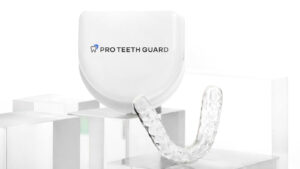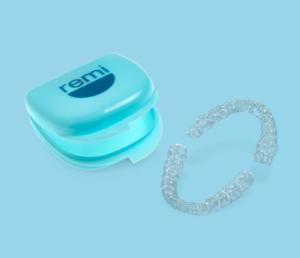Night guards play a vital role in dental care. They are dental appliances made of soft or hard plastic that cushion the teeth against the force of clenching. They are most effective for addressing sleep bruxism, a condition where individuals grind or clench teeth unconsciously during sleep. As a result, night guards help prevent tooth damage, headaches, and inflamed gums.
The proper positioning of the night guard is vital. Ideally, the front teeth should not touch the night guard while wearing. Instead, the guard acts as a protective barrier, preventing direct contact between the upper and lower teeth. However, discomfort in the front teeth area is one of the most common dental night guard side effects, which happens due to several reasons.
If your front teeth are hurting after wearing a night guard, read on to learn why it’s happening and explore the solutions to resolve this issue.
Top 2 Recommended Night Guard Options to Prevent Teeth Pain


How Long Does It Take for Teeth to Adjust to Night Guard?
Teeth usually take around three weeks to adjust to a new night guard. The initial 1-5 days can be the toughest, followed by decreasing discomfort in the first 1-2 weeks. Significant relief is common within 1-3 months, and after 3 months, the night guard tends to feel entirely comfortable and barely noticeable.
Potential Causes of Front Teeth Pain After Wearing Mouth Guard
Causes of front teeth pain after wearing a mouthguard may stem from various factors, such as an ill-fitting guard, leading to undue pressure on the front teeth. Misalignment, material sensitivity, or altered pressure due to grinding patterns during sleep could contribute to discomfort. Additionally, the adjustment period, typically taking up to three weeks, might induce initial discomfort.
Understanding the triggers behind pain and discomfort in front teeth pain post-mouthguard use helps choose and stick to an optimal solution. Read on to learn about the potential causes and tailored remedies, ensuring a more comfortable experience and addressing the underlying concerns effectively.
Improper Fit and Design
An improper fit and design of the night guard is likely to be the culprit behind front teeth pain. Night guards are available in various types, each made for diverse teeth grinding levels and teeth positions. Depending on your particular dental issue, you need a suitable night guard that fits you properly.
- Over-the-counter night guards: One-size-fits-all guards available without a prescription.
- Custom-fit night guards: Tailor-made for a precise and comfortable fit, crafted by dental professionals or direct-to-customer using digital technology.
- Soft night guards: Flexible, rubbery materials suitable for intense teeth grinding.
- Hard night guards: Made from acrylic or tough plastic, recommended for moderate to heavy grinding. You can explore our recommended acrylic night guard options to pick the right one for you.
- Dual-laminate night guards: Balance protection and comfort with a hard exterior and soft interior.
- Flat plane occlusal guards: Mold to the top teeth, ideal for disclusion or malocclusion.
- Astron night guards: Unique shape design night guards that help alleviate teeth and jaw pressure.
It is important to note here that not every type may perfectly fit your mouth. One of the most important factors to consider while choosing a night guard is the severity of your issue. Guard material and personal comfort also influence the choice. Consulting a dental professional aids in selecting the most suitable night guard for your specific needs.
Expired Usage Time
Night guards have a lifespan, and their effectiveness diminishes over time. If the usage period of a night guard has expired, it is no longer effective in safeguarding the teeth against grinding and clenching.
The lifespan of night guards varies depending on the type and material used. Typically, a night guard for teeth grinding can stick around from 6 months to 3 years. The softer mouth guards might need switching every 6 to 12 months, while the harder ones last from 2 to 5 years. But if you grind a lot, or your mouth changes, they might not last as long.
As they get older, night guards can lose shape or feel less comfy, not doing the job well anymore. Keep an eye on any changes in how you feel and swap the guard if it starts looking worn out or doesn’t protect your teeth like it should. An old guard won’t give the protection needed against teeth grinding, so get a new one when it’s time.
Night Guard Material Sensitivity
Material sensitivity can contribute to front teeth pain after wearing a mouth guard. Certain individuals might react adversely to the materials used in the guard, leading to discomfort or soreness in the front teeth area.
The materials commonly used in mouth guards, such as acrylic or rubbery substances, may not suit everyone. Sensitivity reactions can manifest as irritation, inflammation, or soreness in the gums, teeth, or jawline, particularly in contact areas with the guard. This discomfort might be mistaken as a problem with the fit or adjustment of the guard.
Identifying material sensitivity is crucial when experiencing pain in the front teeth after wearing a mouthguard. If a hard material night guard feels tight and uncomfortable to wear, switch to softer materials or a dual laminate night guard. Exploring alternative materials or opting for hypoallergenic options can alleviate this discomfort and ensure a more comfortable experience.
Practical Solutions for Front Teeth Pain
A night guard is used to resolve dental issues that cause tooth damage and disrupt your sleep, so having front teeth pain as a side effect of wearing them can be disappointing. Thankfully, there are practical solutions that can help alleviate the discomfort. Follow these effective remedies and actionable tips that can provide immediate relief, address discomfort, and enhance the overall night guard experience.
Wear Your Guard During the Day
For a quicker adaptation, consider wearing your mouth guard during the day. Doing so provides multiple benefits, such as shielding teeth from damage caused by grinding and clenching. Wearing the guard during daytime hours can expedite acclimatization, offering comprehensive protection and comfort around the clock.
Additionally, it helps alleviate jaw pain, enhances sleep quality by preventing teeth-related disruptions, and reduces snoring by keeping the airway open. It even aids in protecting teeth during athletic activities.
Actively Create Healthy Routines
Wearing your night guard as a routine every night is significant for several reasons. First, it ensures uninterrupted protection against teeth grinding and clenching, effectively mitigating the risk of dental damage and associated discomfort. Moreover, regular use allows for adaptation, enhancing comfort as the mouth and jaw gradually adjust to the guard’s presence.
It’s normal for the adjustment period to take some time. It might take a few weeks for your teeth to get used to the guard.
Inconsistency in wearing your night guard can lead to ineffective adaptation by your teeth, including the front ones. Consequently, you may experience front teeth pain whenever you wear it after a gap.
Consistent wear is also important to manage symptoms linked to conditions like TMJ disorders or bruxism, aiding in the alleviation of jaw pain, headaches, and teeth grinding. By adhering to this nightly routine, individuals maximize the guard’s benefits, ensuring sustained protection and lasting comfort.
Switch to Custom-Made Night Guards
If an improperly fitted night guard is causing pain in the front teeth, switching to a custom-made night guard can significantly benefit individuals experiencing discomfort. When seeking optimal relief for front teeth pain, Remi Night Guard and Pro Teeth Guard stand out as our top recommendations.
These guards provide a personalized fit tailored precisely to your teeth, ensuring enhanced comfort and security compared to generic over-the-counter options. With reduced sensitivity, they alleviate discomfort caused by teeth grinding and bruxism, which is particularly beneficial for those with sensitive teeth.
A custom-made night guard like Pro Teeth offers improved comfort, reducing pressure on the front teeth while potentially alleviating tooth pain linked to grinding and clenching. You can read our Pro teeth guard in-depth review to learn about its features, pricing, and benefits.
You can also go with the Remi night guard, which ensures a more comfortable and effective solution for front teeth pain. In our Remi teeth guard review, you can explore its features and benefits for personalized relief.
Consult a Dentist and Ensure Routine Dental Checkups
If you are still experiencing persistent pain in the front teeth despite using a night guard, as suggested above, you should consult a dentist. An experienced dentist can provide tailored guidance and solutions to address specific concerns related to the guard’s fit, material sensitivity, or potential dental issues.
Regular dental checkups hold immense significance in maintaining oral health. Dentists not only assess the effectiveness of the night guard but also monitor overall dental well-being, identifying any underlying issues contributing to the discomfort. For instance, your front teeth may signal another issue unrelated to a night guard, such as gum disease.
Routine checkups ensure timely interventions, optimizing the guard’s function and addressing any emerging dental concerns, thereby promoting long-term oral health and comfort.
Conclusion
Managing front teeth pain associated with night guard use demands a strategic approach. The takeaways from this article sum up what you need to do if you are facing the issue. Recognize potential causes like material sensitivity or poor fit contributing to front teeth pain. Wear the guard consistently for effective protection and adaptation.
Options like Remi Night Guard or Pro Teeth Guards offer personalized fit and reduced sensitivity. Lastly, consult a dentist if experiencing persistent discomfort despite using a night guard.




